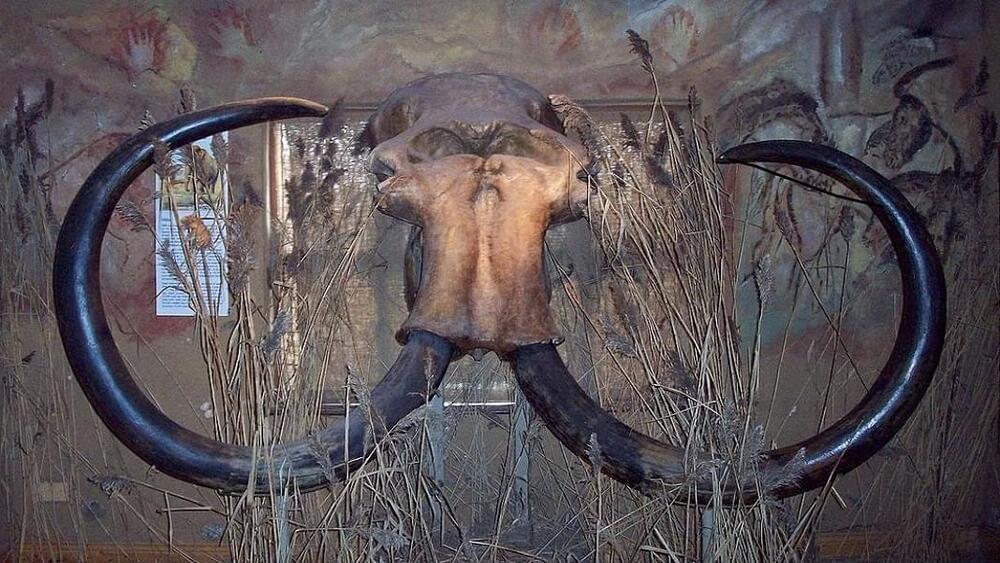KELVIN OGBA DAFIAGHOR joins us all the way from Nigeria to attend #GISECGlobal 2022. He is the CEO of the Ogba Educational Clinic and he decided to visit GISEC to network with cybersecurity professionals from all over the world, as well as tech giants exhibiting at the show. It’s been an absolute pleasure having you with us, Kelvin, see you in 2023! 🤩.
Category: education – Page 119

Dear everyone
We — educators, scientists, psychologists — started an educational non-profit Earthlings Hub, to help out the kids, affected by the war. We talk to them about STEM, but also about the complexity of the world, philosophy of science, future, and existential risks. We also offer psychological help to their parents. Our advisory board includes NASA astronaut Greg Chamitoff, lead AI researcher Joscha Bach, Professor of Learning and Cognition, author of Netlogo language Uri Wilensky, lead early math educator Maria Droujkova and others. Please share, participate, donate! https://www.earthlingshub.org/

JPL and the Space Age: The Changing Face of Mars
Other than Earth, no planet in our solar system has been so thoroughly or long examined as Mars. For decades, NASA’s Jet Propulsion Laboratory has continuously explored the Red Planet with an array of orbiters, landers, and rovers.
What laid the groundwork for this unparallel record of exploration? This 90-minute documentary describes the challenges of JPL’s first attempts to send spacecraft to the Red Planet.
For much of human history, Mars was no more than a tiny reddish dot in the sky. But in 1965, the first spacecraft ever to visit Mars, JPL’s Mariner 4, began to change our understanding of the planet with its grainy black and white images. The data from Mariner 4, and from missions that followed, were full of confusing data for scientists to understand.
The Changing Face of Mars reveals, through archival footage and interviews with key scientists and engineers, JPL’s first roles in exploring the Red Planet, from Mariner 4, through the 1976 arrival of the Viking orbiters and landers.

Clockwork DevTerm R-01 Takes RISC-V Out For A Spin
If you’re anything like us you’ve been keeping a close eye on the development of RISC-V: an open standard instruction set architecture (ISA) that’s been threatening to change the computing status quo for what seems like forever. From its humble beginnings as a teaching tool in Berkeley’s Parallel Computing Lab in 2010, it’s popped up in various development boards and gadgets from time to time. It even showed up in the 2019 Hackaday Supercon badge, albeit in FPGA form. But getting your hands on an actual RISC-V computer has been another story entirely. Until now, that is.
Clockwork has recently announced the availability of the DevTerm R-01, a variant of their existing portable computer that’s powered by a RISC-V module rather than the ARM chips featured in the earlier A04 and A06 models. Interestingly the newest member of the family is actually the cheapest at $239 USD, though it’s worth mentioning that not only does this new model only include 1 GB of RAM, but the product page makes it clear that the RISC-V version is intended for experienced penguin wranglers who aren’t afraid of the occasional bug.
Beyond the RISC-V CPU and slimmed down main memory, this is the same DevTerm that our very own [Donald Papp] reviewed earlier this month. Thanks to the modular nature of the portable machine, this sort of component swapping is a breeze, though frankly we’re impressed that the Clockwork team is willing to go out on such a limb this early in the product’s life. In our first look at the device we figured at best they would release an updated CPU board to accommodate the Raspberry Pi 4 Compute Module, but supporting a whole new architecture is a considerably bolder move. One wonders that other plans they may have for the retro-futuristic machine. Perhaps a low-power x86 chip isn’t out of the question?
Dr. Douglas Willard — Game Changing Development Program, Space Technology Mission Directorate, NASA
Advancing Space Tech For Future Missions — Dr. Douglas Willard, Ph.D., Game Changing Development Program, Space Technology Mission Directorate, NASA
Dr. Douglas E. Willard, PhD, (https://www.nasa.gov/directorates/spacetech/game_changing_de…g-willard/) is Program Element Manager, Game Changing Development Program, Space Technology Mission Directorate, at the U.S. National Aeronautics and Space Administration (NASA).
The Game Changing Development (GCD) Program advances space technologies that may lead to entirely new approaches for the Agency’s future space missions and provide solutions to significant national needs. GCD collaborates with research and development teams to progress the most promising ideas through analytical modeling, ground-based testing and spaceflight demonstration of payloads and experiments and their efforts are focused on the mid Technology Readiness Level (TRL) range 0, generally taking technologies from initial lab concepts to a complete engineering development prototype. The Program employs a balanced approach of guided technology development efforts and competitively selected efforts from across academia, industry, NASA, and other government agencies.
GCD strives to develop the best ideas and capabilities irrespective of their source. The Program’s investment in innovative space technologies directly supports NASA’s mission to “Drive advances in science, technology, and exploration to enhance knowledge, education, innovation, economic vitality, and stewardship of Earth”. GCD’s focus on transformative space and science technologies will enable science missions and NASA’s Artemis Program. Additionally, GCD’s technology developments serve as a stimulus to the U.S. economy while providing inspiration and opportunity to our nation’s youth.
Previously, Dr. Willard was the Deputy Division Chief of the Laboratories, Development and Testing Division at the NASA’s Kennedy Space Center. He served in many leadership roles at Kennedy, including Chief Engineer for Research & Technology Development and Branch Chief of the Engineering Analysis Branch within the Engineering Directorate. He also served for many years as a research physicist in Kennedy’s Applied Physics Lab.

Can We Resurrect Extinct Species? Scientists Put Jurassic Park to the Test
De-extinction grabbed our imagination in the 90s with Jurassic Park. Scientists have since asked: how possible is it?
According to a new study, nearly impossible. But wait—it’s not all bad news. While bringing back a faithful copy of an extinct species may be impossible, we could bring back a hybrid species that’s a genetic mix between an extinct species and its modern descendant.
Published in Current Biology, the study eschews the grandiose mammoth, instead focusing on a tiny test case: the Christmas Island rat. Hefty in size and loudly vocal when invading docked ships and their cargo, the rodents were last seen in the 1900s. With a stroke of luck, the team recovered DNA from two well-preserved museum samples and compared them against a close relative: the Norway brown rat, a popular lab model for genetic studies today.
TOP 5 Female Humanoid Robots 2022 That Will Shock You | PRICE REVEALED!
PRICE REVEALED!🔔 Subscribe now for more Technology news, Future technology news, and Science.
news. In this age of innovation and technology, an increasing number of.
companies are developing extremely human-like robots that will.
collaborate attentively with actual humans in the hospitality or customer.
service sectors.
Such robots have a long history dating back to the 4th century when the.
concept of a humanoid robot first appeared in many different cultures.
around the world, including Greece, China, and even Japan!#humanodrobot #bostondynamics #artificialintelligence📺Interesting fact: Smart individuals watch the full video!
🤖 AI News brings you the most recent Artificial Intelligence news and trends. Investigate industry research and stories from the cutting edge of AI technology news.🕵️We take the greatest research and give it our own spin, report from the frontlines of the industry, and feature contributions from firms at the forefront of this revolution.
💼 Business Inquiries and Contact.
• For business inquiries, copyright matters or other inquiries please contact us at [email protected]❓ Copyright Questions • If you have any copyright questions or issues you can contact us at [email protected] ⚠️ Copyright Disclaimers • We use images and content in accordance with the YouTube Fair Use copyright guidelines • Section 107 of the U.S. Copyright Act states: “Notwithstanding the provisions of sections 106 and 106A, the fair use of a copyrighted work, including such use by reproduction in copies or phonorecords or by any other means specified by that section, for purposes such as criticism, comment, news reporting, teaching (including multiple copies for classroom use), scholarship, or research, is not an infringement of copyright.” • This video could contain certain copyrighted video clips, pictures, or photographs that were not specifically authorized to be used by the copyright holder(s), but which we believe in good faith are protected by federal law and the fair use doctrine for one or more of the reasons noted above.

Elon Musk Shares Transphobic Meme Following Report of Grimes Dating Chelsea Manning
Sooner or later Musks childish, morally and politically inept use of social media will thwart his greater (and great) ambition. Whatever your personal beliefs, there is exactly ZERO doubt that every generation since and including millennials has become exponentially less willing to tolerate this kind of stuff. Musk is going to NEED to both the fresh and enthusiastic intelligence and majority scale support, and not JUST in SpaceX research labs and on site engineering teams either.
He’s going to need IMMENSE, PROLONGED, and RELIABLE political support even as the reins of power are being passed from one generation to the next. If he keeps using Twitter like he has nothing to lose and no one’s support He’s going to find that he really does no longer have anything to lose nor anyones support.
At that point, he’ll have difficulty getting from city to city, much less get to Mars to build CITIES or become a secure, far more survivable interplanetary civilization!
That would be a tragedy of possibly humanity extinguishing scale. Is THAT really worth the freedom to act like an entitled, petty child on social media?!
Musk and his dreams already have enemies enough. Why put HIMSELF at the top of that list? After all, this dream is NOT his alone, nor even remotly it’s originator. He’s just the only person to have the right mix of buisness acumen, technological literacy, enthusiasm, imagination, discipline, charisma, and luck to actually make it a reality. If he fails now, that dream WILL die. Whether its because of global warming, war, disease, atrophied critical thinking skills, educational decline, all of the above or some black swan event, the funds, time, will, and the global interconnectedness between scientific institutions and freedom to innovate and leverage those many convergent capabilities to achieve what MUST be achieved will be reduced or gone entirely. ☝️🤨👈
The post Elon Musk Shares Transphobic Meme Following Report of Grimes Dating Chelsea Manning appeared first on Consequence.